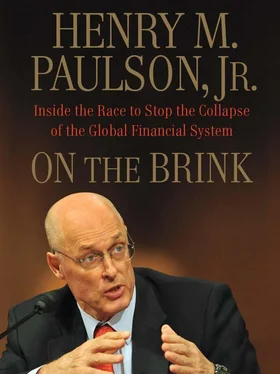Boehner, who had just gotten through telling us in the Oval Office that he didn’t have the votes, said he was trying to find a way to get House Republicans on board. “I am not talking about a totally new deal, but we do need to tweak the core part of the program,” he said.
He raised the idea of including Cantor’s unformed insurance plan. Obama asked me if it was consistent with what we were trying to do elsewhere, and I said it wasn’t.
Decorum started to evaporate as the meeting broke into multiple side conversations with people talking over each other. Shelby waved a sheaf of papers, claiming they were from more than 100 economists who all thought TARP was a bad idea. He said we needed time to consider this plan. The president jumped in to say, “No, this is a situation where we need to act. We don’t have time to have hearings with a bunch of economists.”
McCain still hadn’t spoken. Finally, raising his voice over the din, Obama said loudly, “I’d like to hear what Senator McCain has to say, since we haven’t heard from him yet.”
The room went silent and all eyes shifted to McCain, who sat quietly in his chair, holding a single note card. He glanced at it quickly and proceeded to make a few general points. He said that many members had legitimate concerns and that I had begun to head in the right direction on executive pay and oversight. He mentioned that Boehner was trying to move his caucus the best he could and that we ought to give him the space to do that. He added he had confidence the consensus could be reached quickly. As he spoke, I could see Obama chuckling.
McCain’s comments were anticlimactic, to say the least. His return to Washington was impulsive and risky, and I don’t think he had a plan in mind. If anything, his gambit only came back to hurt him, as he was pilloried in the press afterward, and in the end, I don’t believe his maneuver significantly influenced the TARP legislative process.
A number of people I respect on the Hill have a different view. They believe McCain ended up being helpful by focusing public attention on TARP and galvanizing Congress to action. And John later did try to find ways for House Republicans to support legislation. But Democrats absolutely did not want him to get any credit. They wanted the economic issue as their own. Accusing McCain of blowing up a nondeal was just hardball political tactics. But when it came right down to it, he had little to say in the forum he himself had called.
Then Spencer Bachus chimed in to say that while he and House Republicans had not endorsed a deal, he was proud that House Republicans had been successful in including strong taxpayer protections. Pelosi jumped in, insisting vociferously that House Democrats were responsible for the taxpayer protections, not House Republicans. They began speaking over each other, as the president tried to restore order, and before long Pelosi and Bachus were yelling at each other. The room descended into chaos as the House and Senate members erupted into full-fledged shouting around the table. Frank started to loudly bait McCain, who sat stony-faced.
“What’s the Republican proposal?” he pressed. “What’s the Republican plan?”
It got so ridiculous that Vice President Cheney started laughing. Frankly, I’d never seen anything like it before in politics or business—or in my fraternity days at Dartmouth, for that matter.
Finally, the president just stood up and said: “Well, I’ve clearly lost control of this meeting. It’s over.”
As everyone left the room, I was appalled and disheartened. Not only had I witnessed conduct I could never have imagined before, but we didn’t even have a deal. If anything, people seemed further apart than before.
The Democrats had gathered in the Roosevelt Room and I became concerned that they would say something inflammatory to the press when they left. So I decided to approach them and urge moderation.
Everyone was huddled around Obama at the west end of the room, and when they saw me there was an uproar. They shouted at me to leave. I didn’t know what to do. Then, in an attempt at levity, I walked over to Pelosi and dropped to my knees, genuflecting at the altar of the Speaker of the House.
“Nancy,” I started to say.
She burst out laughing. “Gee, Hank, I didn’t know you were Catholic.”
“Don’t blow this up,” I said. It had been a difficult meeting, I acknowledged, but we all needed to come together.
“We’re not the ones trying to blow this up,” she said.
Friday, September 26, 2008
The run on Wachovia began Friday morning, September 26. The North Carolina bank had been struggling for months, but once the FDIC had seized WaMu the day before, traders began treating Wachovia as if it were next in line to fall. Overnight its credit default swaps soared, and loyal institutional and corporate customers fled, emptying transaction accounts. By day’s end, $5 billion would be gone and shares of the bank would fall by 27 percent, to $10.
The collapse of WaMu was awful, but Wachovia was another order of magnitude altogether. With branches all over the country, from California to the Carolinas and up through the Northeast, it was the fourth-largest bank in the U.S. by assets, and the third by domestic deposits. Wachovia had grown rapidly through acquisitions. One of those purchases had proven to be its undoing: Golden West Financial, a big California savings and loan stuffed with option adjustable-rate mortgages. Wachovia had bought the thrift in 2006 at the peak of the housing boom.
With Wachovia’s long-term customers pulling their money, we at Treasury knew it was only a matter of time before it failed. That was unthinkable; our financial system could not have withstood its demise. But I had decided to keep at a distance from any negotiations. My former colleague Bob Steel had left in July to steer Wachovia through this crisis, and he would be breaking the law if he talked to me or anyone at Treasury on behalf of his bank.
I had reviewed Wachovia’s plight with Tim Geithner early in the morning, and it was very much on my mind at my regularly scheduled Friday breakfast with Ben Bernanke at the Fed. We were optimistic that Wells Fargo or Citigroup would step up and buy Wachovia. If not, the regulators had the necessary powers to deal with a failing bank, although I was confident that everyone understood the necessity of avoiding such an outcome.
I was still mulling over the strange events of the previous day, and what they might mean for TARP. After the disastrous Cabinet Room meeting, I had wondered if we’d ever get lawmakers to agree. It was a good thing, as Obama had said when we spoke by phone late Thursday evening, that the public hadn’t seen the indecorous partisan brawling, or there would have been no confidence left in the market.
Yet some good had come from that difficult day. As Ben had told me the night before, “I don’t know what you said to McCain, but whatever it was, it’s working. He’s now saying all the right things.”
I had also seen the beginnings of a bipartisan spirit at work on Thursday evening in a crowded, closed-door negotiating session on the Hill. We’d gone there after the Cabinet Room debacle, determined to make progress. The meeting was surprisingly productive, and I had left mildly optimistic.
But with WaMu’s collapse and the run on Wachovia, it was clear that the markets weren’t going to pause to see how TARP made out before punishing their next victim. Banks had stopped lending to one another, and the money markets remained all but frozen.
John McCain called midmorning. He sounded upbeat though apologetic about the previous day’s fracas. “Boy, what a difficult meeting,” he said. “The reason I didn’t say anything at the end was because it’s pretty hard to say anything with Barney Frank screaming at you.”
Читать дальше












